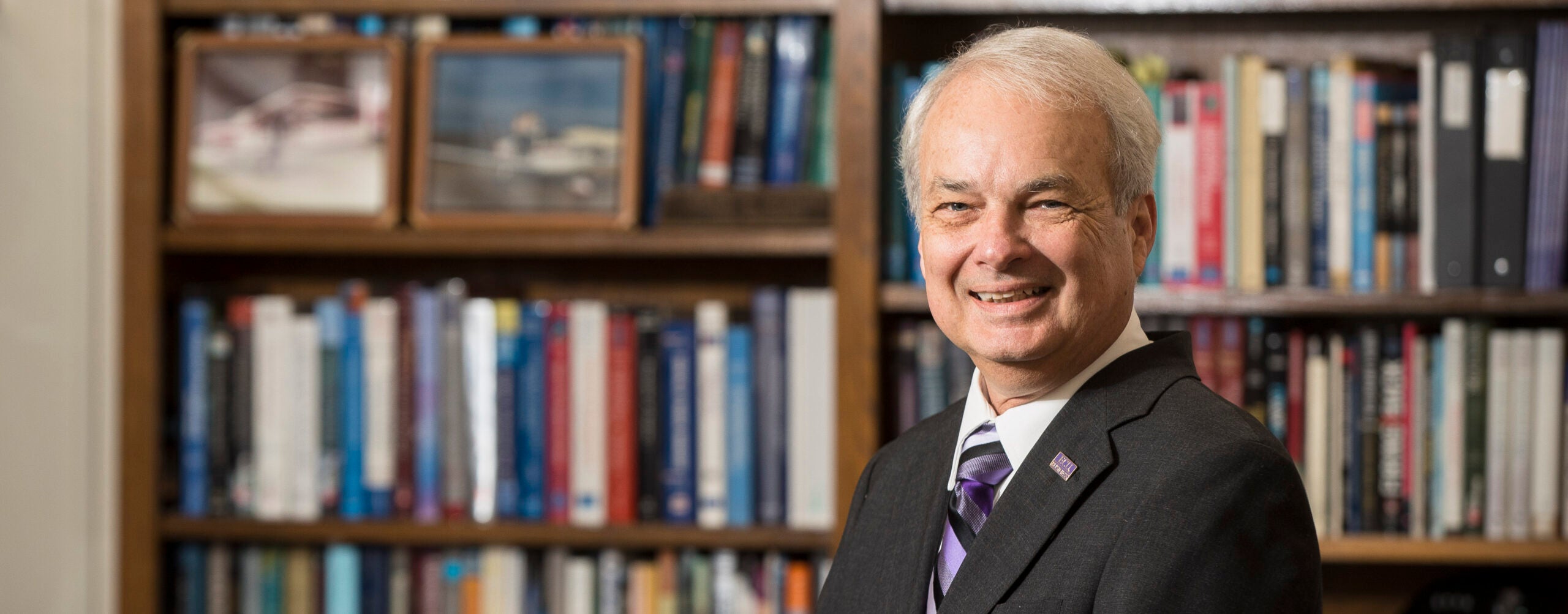April 24, 2024
Stan Eakins: a legacy for the ages
Dr. Stanley Eakins served as the dean of the College of Business for more than eight years between 2010 and 2018, including his time as acting dean. Eakins came to East Carolina University in 1990 after receiving his doctorate from Arizona State University. Before entering academics, he was a bank vice president and a chief financial officer for a multi-million-dollar construction and development company.
As dean, Eakins’ goals for the college centered on three areas: enhancing the leadership program, engaged learning and building an entrepreneurship program.
Eakins era starts with leadership
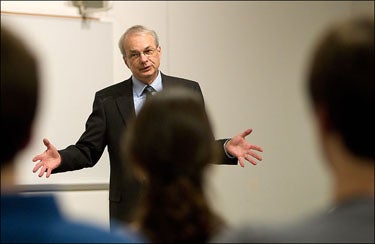
“When I came in as associate dean in 2005, our graduates were struggling in the job market,” said Eakins. “Likewise, the College was not getting enough companies coming into interview our students.”
Eakins and a faculty committee were tasked to develop a curriculum that could help graduates professionally prepare for their careers. They spoke with everybody, including alumni whose companies did not visit the College of Business and the ECU career center director, who received firsthand input from companies that visited the College and spoke with students.
Eakins carved out the funding and subsequently, one class was initiated, and then there were two classes. Two turned to three, and three turned into four classes, covering everything from resume preparation to interviewing skills to networking to presentations. There was even instruction on dining etiquette that included a very difficult-to-eat meal with alums.
What was the result? The first-of-its-kind Professional and Leadership Development Curriculum.
“ECU business students can successfully compete with anyone in the country, and our recruitment numbers prove it,” said Eakins.
A guide on the side
Eakins wanted to change the traditional instruction method, which typically featured a lecture, homework and testing. He wanted to move the COB from the “sage on the stage” approach to the “guide on the side” approach.
Under Eakins’ guidance, the Bate Building was updated with classrooms designed to be more collaborative in nature. Tables were brought in, replacing traditional desks so students could discuss with other students. Labs were set up to give the instructor more room to work with students individually. Projects can start in the classroom, and one can gain instant feedback if there are issues. Chairs like those found in traditional classrooms were replaced with pivoting/swing chairs, making it easier for one-on-one discussions and group work.
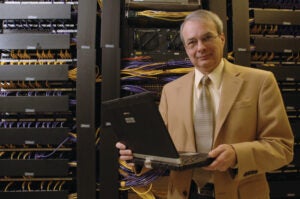
“The goal was to make the classrooms more engaged, where small groups of students could work on projects and learn together,” said Eakins. “We need to realize that the modern student wants to be engaged in learning.”
In addition to changing the classrooms, Eakins oversaw the construction of the Student Technology Center, which encourages students to interact with each other and faculty. Today, the STC includes congregation and lounging areas, a big touch-screen TV, meeting rooms and computer workstations.
“It provides the central greeting area for the college,” said Eakins.
And now, we have an entrepreneurship school
A lot of good ideas start with a feeling. With Eakins, he believed many COB students didn’t want to move to Raleigh or Charlotte upon graduation. That wasn’t their goal.
“(In eastern North Carolina) employment opportunities were limited,” said Eakins. “Many of our students come from existing family businesses, and they’re being tasked with taking over and enhancing the business.”
Eakins realized these students needed a skillset to help them go to their family businesses and build something bigger.
This realization became the seed of the Miller School of Entrepreneurship.
“It had been in my mind,” said Eakins.
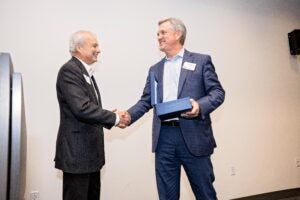
And, apparently, it was in the back of Fielding Miller’s mind, as well. A chance invite from alumnus Kel Normann to join his tailgate allowed Eakins to have a discussion with Miller.
“And, pretty quick, Fielding asked if I’d ever had an interest in entrepreneurship,” said Eakins.
Soon, Miller, Eakins and then-Chancellor Ballard were on the top floor of CAPTRUST, the company co-founded by Miller, hammering out the details of the Miller School of Entrepreneurship, the first named school of entrepreneurship in North Carolina.
What came out of the meeting? A regional hub that prepares generations of ECU students to take an entrepreneurial mindset into their communities. The school infuses a culture of innovation and leadership across the campus and region using academic programs, workshops, research, public-private entrepreneurial partnerships, and other services that respond to the needs of eastern North Carolina students and small businesses.
Within three years, the new school was rated in the top 50 in the nation. Today, the Miller School’s flagship program, the Pirate Entrepreneurship Challenge, is the largest pitch competition in the state and has awarded almost $1 million in cash and in-kind services since its inception. Other programs have also been established that connect students and faculty with startup businesses that need extra entrepreneurial knowledge to launch their products and create jobs.
The gift that keeps on giving
Eakins’ vision for establishing an entrepreneurial mindset for COB’s students and creating an ecosystem for ECU caught the attention of other COB alums. Not long after the establishment of the Miller School, Van and Jennifer Isley pledged a $2 million gift to the College of Business to establish the Isley Innovation Hub, a place where all ECU students could gather and ideate to hopefully cultivate a seed for an idea that could soon find a market. In 2019, Matt Crisp and his wife, Kim, gave a gift of $1 million to establish the Crisp Small Business Resource Center, whose mission is to provide access to best practices and proven knowledge for ECU students and area entrepreneurs who plan to start or sustain enterprises in eastern North Carolina.
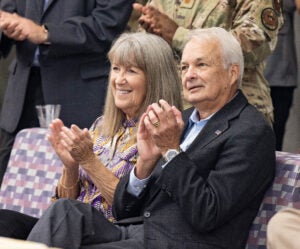
And the impetus for Thomas Arthur’s gift to name the COB’s graduate school started under Eakins.
Eakins would be remiss if he didn’t acknowledge Jim Westmoreland, who spent more than 20 years in the College of Business, including serving as the college’s associate dean of external affairs.
“Everybody knows Jim and his passion for ECU and the College of Business,” said Eakins. “He was critical in our fundraising efforts. Without his guidance, the college could not have increased its foundation from $8 million to $26 million while I was dean.”
Establishing a Legacy
“It turns out being a dean is a lot of work,” said Eakins with a wry smile but with a vast amount of truth.
When asked about any words of advice for future COB deans, he “didn’t want to go there,” as he puts it. He said they’ll find their own success in their own ways.
However, when asked about his legacy, Eakins said, “I’m happy with what I’ve accomplished.”
So is the College of Business, and so is Pirate Nation.
- Categories:
- Academic

